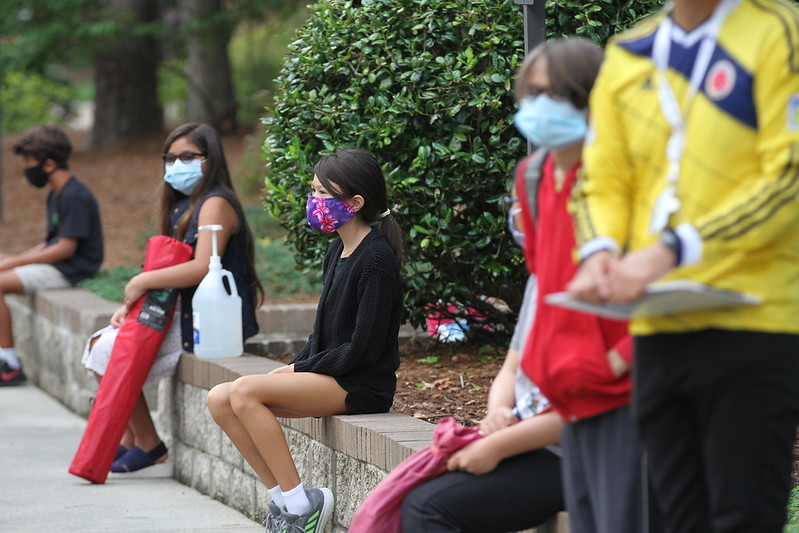December 13, 2020
Written by Faith Hanson ’23
Ask anyone where they were when the tragedy of 9/11 occured. Almost always they’ll be able to recall the exact time and place they were on that seemingly normal Tuesday morning: people simply don’t forget something like that. Although the events of 9/11 and the current global pandemic are two completely different occurrences, we can still utilize the idea of reflecting on where each of us was when something unimaginable happened. With this idea in mind, four Durham Academy high schoolers were surveyed about COVID-19.
First, freshman Margaret Jester recalls where she was when she first heard the news of the pandemic: she was in English class, just like any other regular day. At the time, Margaret didn’t think it was a big deal. She remembers herself, along with the rest of the class, being excited for the extra upcoming break. Sophomore Sanju Patel and junior Charles McCain each tell similar stories. Sanju remembers thinking that the pandemic was “just another news story.” He never would have anticipated the overwhelming influence of the coronavirus. In comparison, Charles’s first memory of the pandemic was after the gratitude assembly in March. After someone told him corona would give us an extra week or two of spring break, Charles disbelievingly thought it was a joke.
Senior Rebecca Urato’s first memory from the pandemic is from the last day of school before spring break. She remembers thinking how scary it was that “teachers were already planning for us to not go back to school.” Even still, most of her class was adamant that the virus wouldn’t make its way to North Carolina. Rebecca continues that Mr. Wilson’s announcement that assemblies would be canceled even if school were to return brought her happiness at the time, but she “didn’t even consider that [her] entire class might never sit in Kenan auditorium altogether again.”
While each of these responses vary in detail, they all share the same theme: no one imagined life would be the way it is now. Masks are now the most popular and necessary accessory. The words ‘social distancing’ and ‘hybrid learning’ have been added to our vocabularies. Let the gratitude assembly serve as a reminder that the future is unpredictable, and you never know how good the present is until it’s gone. As Rebecca disclosed, “it is crazy to think that the entire upper school was sitting in Kenan with no masks, not socially distant, and without major anxiety of contracting the virus yet.”
It is easy to list all of the ways COVID-19 has affected us negatively. For some of us, the virus has meant separations from friends and loved ones. For others, the deprivement of sports has been devastating. The transition to online school and other virtual activities certainly hasn’t been easy. Even as DA, and society as a whole, slowly moves back to in-person events, human interactions are still greatly affected. Masks, while necessary, don’t allow for people to see each other’s faces. Something as simple as smiling at someone as you walk by now holds no meaning. Additionally, masks can make communicating more difficult. Not only do masks make it harder to understand verbally, but they also eliminate the possibility of reading facial expressions. Finally, the coronavirus has essentially made touching a taboo. Even one of the most universal gestures, shaking hands, disappeared with the coronavirus.
“The first few memories from the pandemic may be ridden with anxiety and fear, but there is also an abundance of hope and excitement and love.”
Despite all this, Rebecca maintains that it was, and still is, possible “to find the positives amidst such chaos, tumult, and confusion.” Reflecting on both my classmates’ and my personal first memories of the pandemic, it is evident that regardless of all the negative ways coronavirus has affected us, it is important to recognize the good things to come out of the pandemic. If anything, the virus has at the very least taught everyone to be more appreciative of how good life was before. It is for this reason that everyone should take the time to reflect on where it all began and be grateful for where we are now. Because, as Rebecca insightfully concludes, “the first few memories from the pandemic may be ridden with anxiety and fear, but there is also an abundance of hope and excitement and love.”
